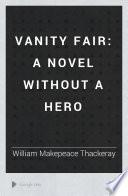
“I think I could be a good woman if I had five thousand a year.”
Vol. II, ch. 6.
Vanity Fair (1847–1848)

Vanity Fair is an English novel by William Makepeace Thackeray, which follows the lives of Becky Sharp and Amelia Sedley amid their friends and families during and after the Napoleonic Wars. It was first published as a 19-volume monthly serial from 1847 to 1848, carrying the subtitle Pen and Pencil Sketches of English Society, reflecting both its satirisation of early 19th-century British society and the many illustrations drawn by Thackeray to accompany the text. It was published as a single volume in 1848 with the subtitle A Novel without a Hero, reflecting Thackeray's interest in deconstructing his era's conventions regarding literary heroism. It is sometimes considered the "principal founder" of the Victorian domestic novel.The story is framed as a puppet play, and the narrator, despite being an authorial voice, is somewhat unreliable. The serial was a popular and critical success; the novel is now considered a classic and has inspired several audio, film, and television adaptations. In 2003, Vanity Fair was listed at No. 122 on the BBC's The Big Read poll of the UK's best-loved books.
“I think I could be a good woman if I had five thousand a year.”
Vol. II, ch. 6.
Vanity Fair (1847–1848)
“The world is a looking-glass, and gives back to every man the reflection of his own face.”
Vol. I, ch. 2.
Vanity Fair (1847–1848)
Context: The world is a looking-glass, and gives back to every man the reflection of his own face. Frown at it, and it will in turn look sourly upon you; laugh at it and with it, and it is a jolly kind companion; and so let all young persons take their choice.